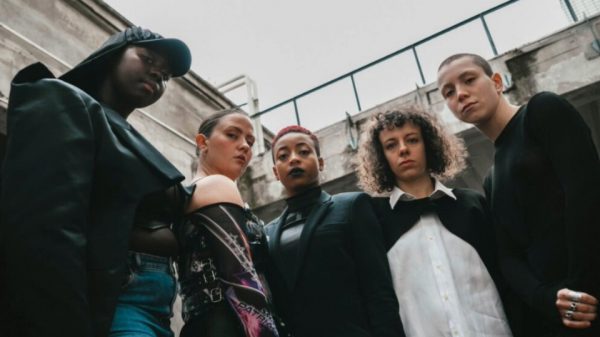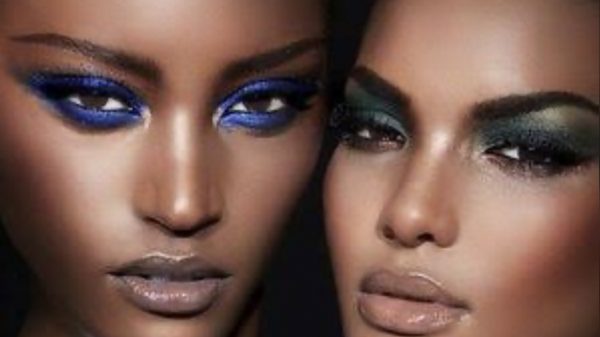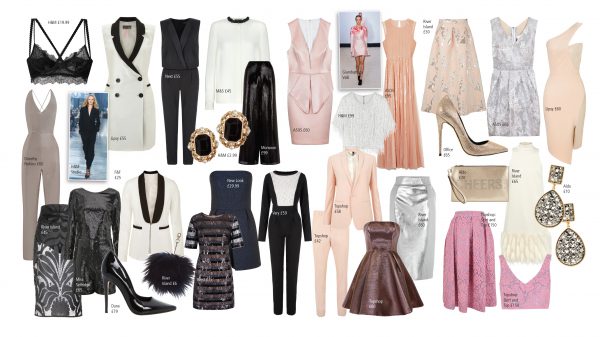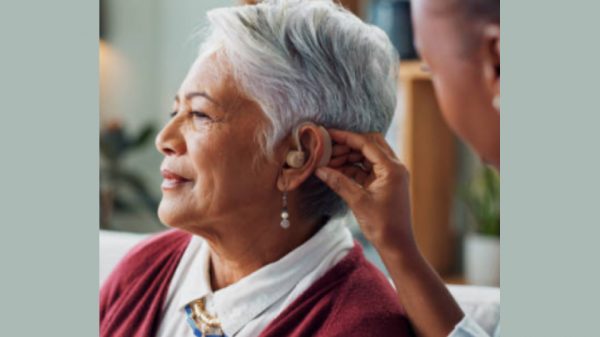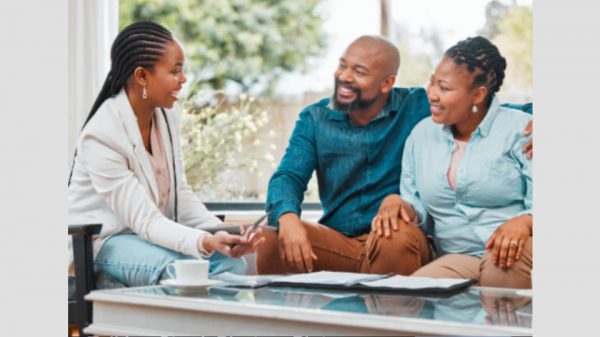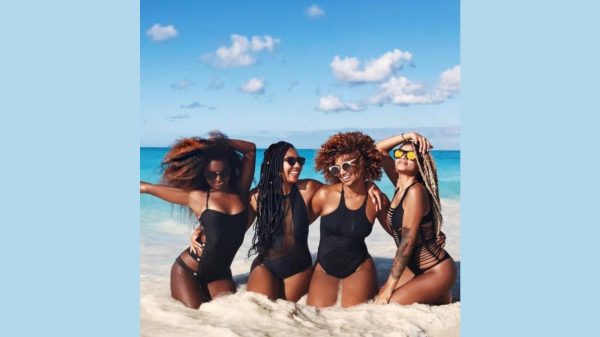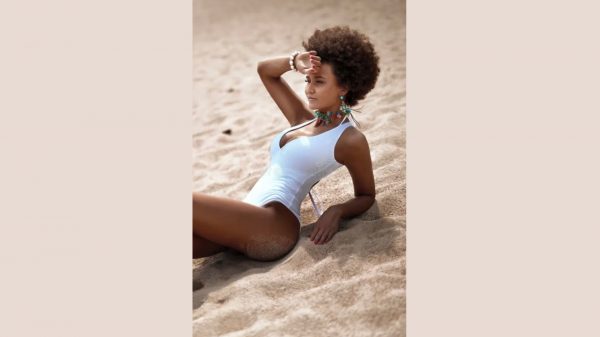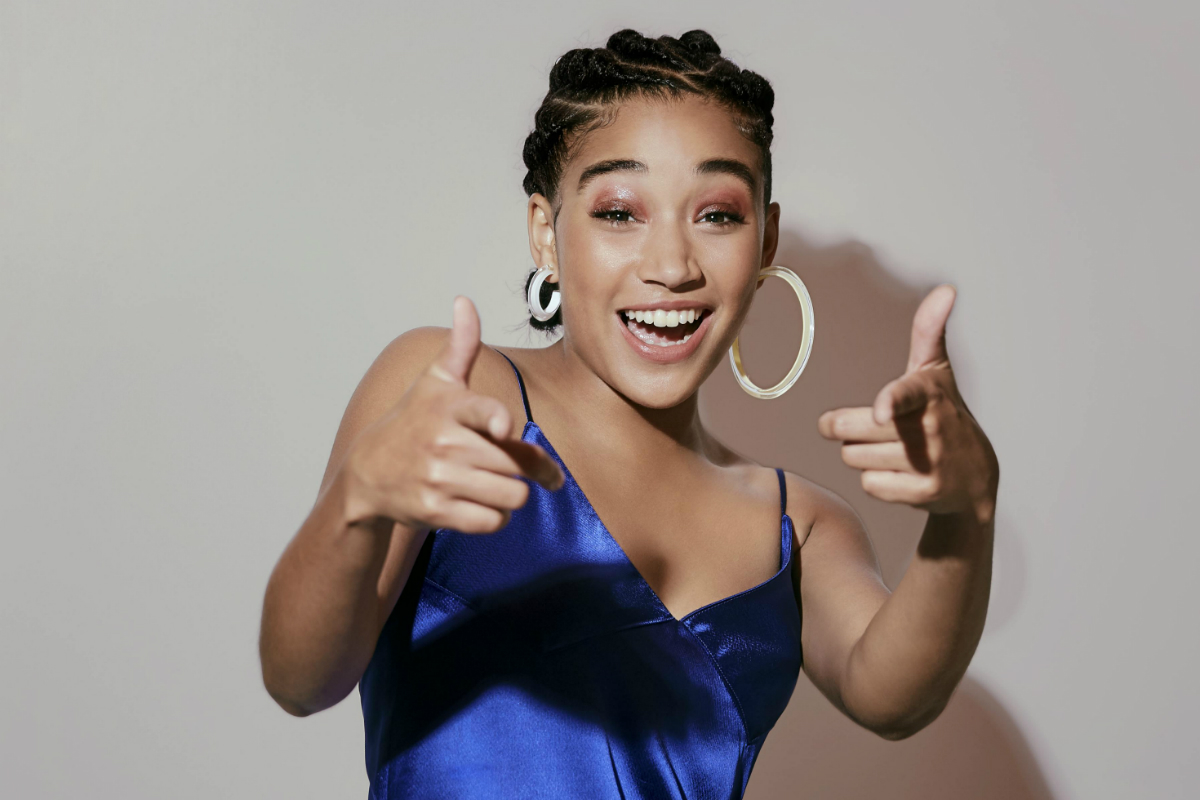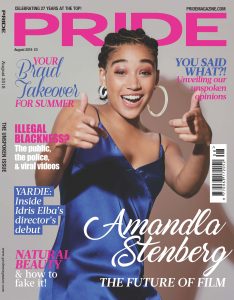With three films set to hit cinemas in the final months of this year, Amandla Stenberg is well on her way to household name status. Nicole Vassell speaks to her about identity, casting controversies and the pressures of being a new age activist
As a film star, musician or anyone who makes a living from their talent in 2018, the question of personal brand is nearly as important as the work you put out. With audiences becoming increasingly demanding of their favourite celebrities to be leaders in social and political fights, people of widespread influence often have the added task of being an activist, speaking up for those who deserve a chance to be heard.
So when I asked Amandla Stenberg how it feels to be not only an actress, but also carrying a range of different hopes from fans on her shoulders, she’s rightfully honest about the pressures:
‘I definitely do have moments where it becomes a little daunting,’ she begins. ‘I don’t claim to know everything, or to always have the answer, but an inherent part of having a platform is having that privilege to be able to ascertain how to utilise it. The most important thing to me is to make people – especially for younger girls, and younger black girls – feel more represented, more seen, more empowered, less alone.’
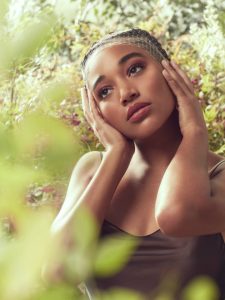
Amandla Stenberg: ‘The most important thing to me is to make people – especially for younger girls, and younger black girls – feel more represented, more seen, more empowered, less alone.’
At the age of 19, her public self has already been crowned as an authority on race, gender and sexuality issues, and is widely considered all-round ‘woke royalty’, as she’s used her social media accounts as well as her personal projects to stand up for people and causes that have been largely excluded from mainstream media.
With her work, Stenberg has made a name for herself starring in films that, despite being marketed towards young adults, do not shy away from offering bleak critiques of society: one of her most popular roles to date was in dystopian blockbuster The Hunger Games (2012) as ill-fated kid fighter, Rue. Last year saw her play the sheltered, sickly daughter of an over-protective mum (Anika Noni Rose) in Everything, Everything, and later in 2018, Stenberg is due to star in World War II drama, Where Hands Touch*, and police brutality film The Hate U Give.
Her upcoming release, The Darkest Minds, imagines a world in which children have been infected by a mysterious virus that either kills them, or gives them unexplained powers. Stenberg plays Ruby, a teenager who has developed one of the most dangerous powers of them all – the power of mind control – and, along with another group of young people, they journey to find a hidden utopian society, where young people rebel against an establishment that tries to suppress their potential.
‘I think there’s a huge parallel between a lot of the themes in the story, and what we’re experiencing right now, when it comes to young people having these amazing tools at their disposal, learning how to use their voices in order to stand up to a system of government that they don’t believe in,’ she says during our transatlantic phone conversation, highlighting just how relevant stories like these are in such politically strained times.
Interestingly, Stenberg was cast as Ruby, even though the role didn’t specifically call for a black actress. In 2018, it’s sadly still shocking when black actors (and actors of colour) get roles that aren’t based specifically around their race. After all, she acknowledges, there’s nothing in the script that means that Ruby had to be white – but the default choices of production teams has often meant that white actors get given first dibs, with others barely getting a chance to try. Clearly, she doesn’t take this experience lightly:
‘I think it’s powerful that I was able to choose to play this role. We see characters like this often, but we don’t get to see them black! It’s a huge honour.’
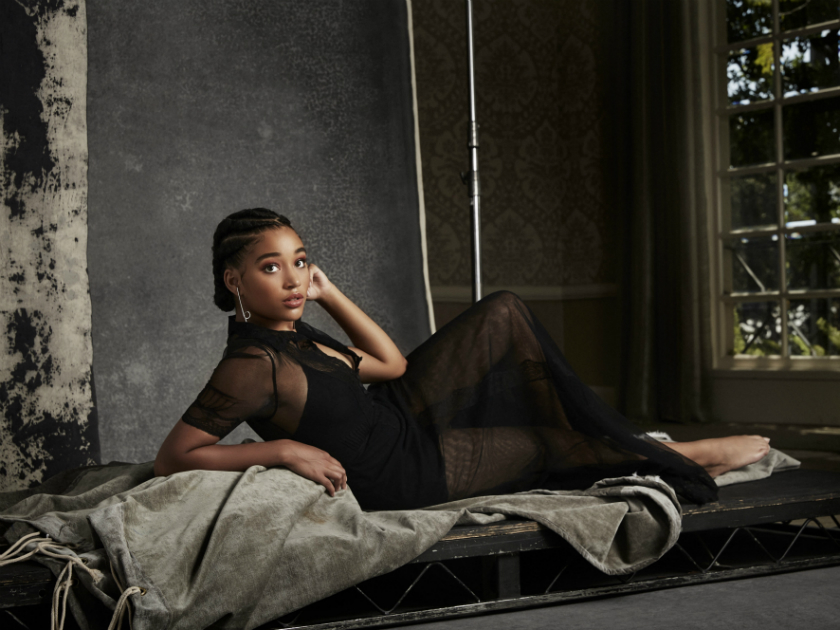
Amandla Stenberg: ‘We live in a world with a real “call-out culture”, that doesn’t really allow people room for that much growth.’
It comes as no surprise that there are messages in the roles that she chooses to take on. Outside of acting, many people’s first introduction to Amandla Stenberg was a viral video from 2015; titled ‘Don’t Cash Crop My Cornrows’, it’s a snappy, but informative clip on cultural appropriation as it applies to black hairstyles – all the more impressive as she was only 16 when she created it. From this, Amandla’s reputation as a bright new hope for the future was paved; she’s at the top of a class of young, talented black people using their talents and their platforms to aid change.
But constantly being referred to this ‘beacon of wokeness’ – doesn’t that get tiring? I ask.
‘Sometimes it does,’ she admits. ‘We do live in a world with a real call-out culture that is really hypercritical and doesn’t really allow people room for that much growth, or understanding. That role is never one that I claimed myself, but I do understand the responsibility of it. So I do think critically of my words, and my actions, and how they can affect people, and there are times where it does get a little frustrating, knowing that there’s always going to be a way in which your actions and words can be misconstrued.’
She knows this intimately. Earlier this year, she spoke about being in the early stages of the audition process of Black Panther, but ultimately withdrawing herself from being considered, as she didn’t believe it’d be ‘right’ for her, as a light-skinned bi-racial woman, to occupy such a space.
Though her acknowledgement of skin colour bias in Hollywood was praised by some, Stenberg found herself at the centre of some barbed comments on Twitter – with some calling her statement ‘self-congratulatory’ and accusing her of trying to make an important cultural moment ‘all about her’.
Months later, she still stands by her decision to step aside from the role.
‘I don’t think that was a film that someone like me needed to be in,’ she began. ‘Of course, that got misconstrued as me trying to perpetuate myself as some sort of light skinned saviour, or arrogant. What that taught me was that no matter what, things can be conceived of differently than you intended. But that’s okay.’
Despite the sting of virtual public flogging, she hasn’t shied away from continuing to speak up – and attributes this to understanding that the climate is a sensitive one, and things are held up to a higher level of scrutiny now than ever before.
But did it take a while to develop this thick skin against critique?
‘Yeah, and I think I’m still learning it,’ she admits. ‘Since I was a little kid, I’ve always been in the public eye, and I’ve always faced criticism. At first, it was because I was “too black”, and recently it’s been that I’m “too biracial”. There’s definitely an irony in terms of how perception has shifted.
‘It’s an inherent part of being a public figure. There’s much privilege in that, but also there comes responsibility, and a knowledge that my public facing self does not always belong to me.’
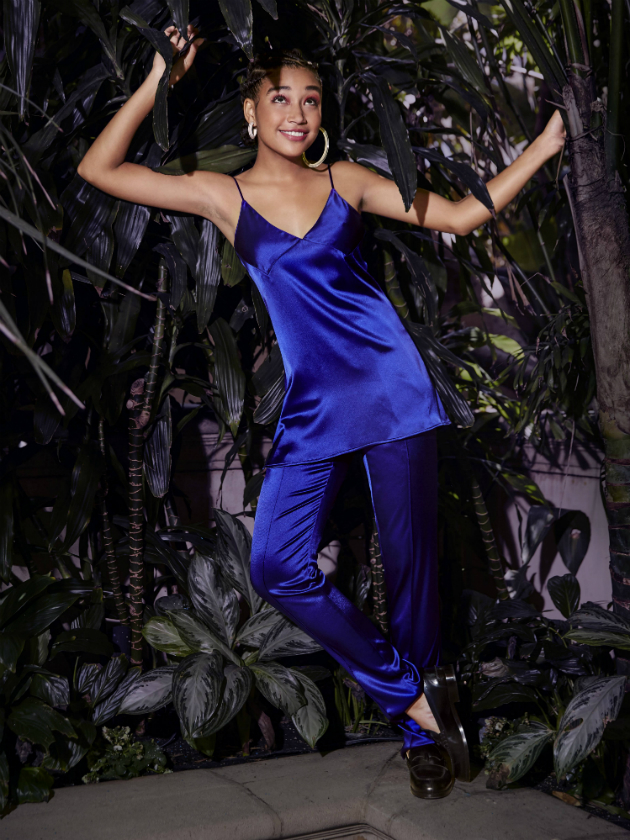
Amandla Stenberg: ‘There’s much privilege in [being a public figure], but also there comes responsibility, and a knowledge that my public facing self does not always belong to me.’
With preference to lighter-skinned people being a prevalent factor across the entertainment industry and beyond, Stenberg winning a role that was imagined for a dark-skinned actress was seen as a yet another occasion of dark-skinned actresses being passed over in favour of someone with a lighter skin tone. This conversation wasn’t alien to Amandla, and when getting involved, she again had to question whether it was her place to take the role.
‘When I read the manuscript, I’d never felt more directly represented in any character – and that’s why I pursued it so hard,’ she explains. ‘Throughout the audition process, it became clear that I was right for the role, partially because of my lived experience and how I can bring that to the table. And when there was controversy around that, I had a very frank conversation with Angie Thomas [the writer], and I said: “Look, if you think a darker skinned girl should be in this role, it’ll sting of course, but I will drop out.”
‘I’d rather…’ she trails off, continuing after a moment, ‘inhabit roles that I feel are right for me, and that I have earned, than to perpetuate a cycle of colourism.
‘Angie told me that I was Starr because I was right for it, and she said that the cover art is one artist’s interpretation of the character, and there’s some room for interpretation there. We all see characters differently.’
However, Stenberg has confidence that when watching the film, those who had hesitations towards her taking up this role will find that she was in fact the correct choice for the part – regardless of her complexion.
‘I think that when people see The Hate U Give, they’ll see why it was the right place for me,’ she reasons. I definitely recognise my privilege as a light skinned actress, and how that has benefitted me, and afforded me easier access. I also understand how, growing up and having to code switch between a black environment and a white environment, it’s afforded me the ability to navigate black and white institutions – and that has been really critical in navigating Hollywood.
‘Those are both privileges – but I never want to insert myself in a place where I don’t think I belong. The places where I do, I work really hard for.’
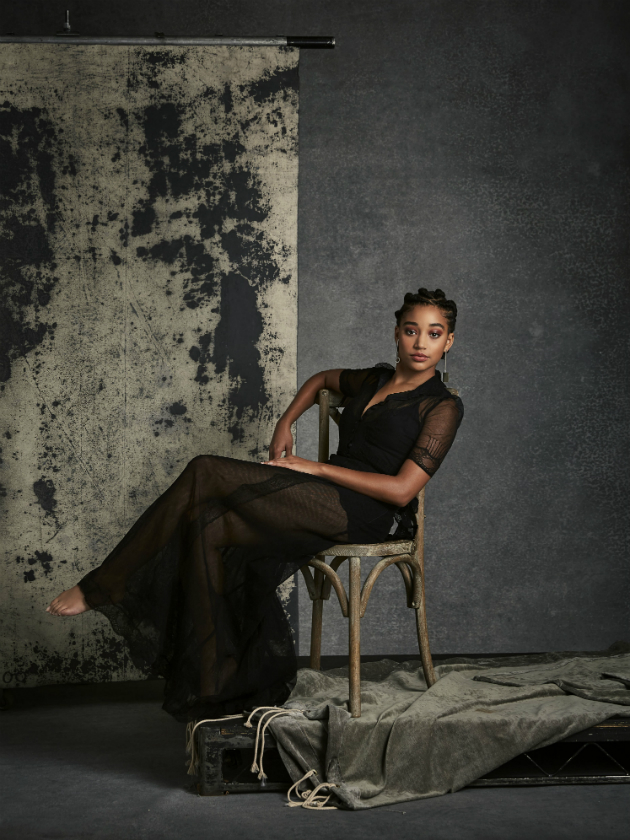
Amandla Stenberg: ‘Had I had more representations of gay women growing up, I think I would have understood my sexuality a lot earlier.’
Her self-confidence is remarkable; though she admits that she’s growing more every day, there’s an enviable level of assuredness that she exudes with every sentence. But her vocal advocacy of an underrepresented communities isn’t exclusive to blackness; she’s also been open about her queer identity. After previously identifying as bisexual, then pansexual (attracted to people regardless of gender identity), Amandla clarified in our conversation that she now identifies as gay.
Despite her sexual orientation, as well as identifying as non-binary (meaning, having a gender identity not specifically masculine or feminine), Amandla’s roles thus far have all been female – and with a white male love interest, if any. When I asked whether she’d be interested in pursuing projects that reflect more alternative identities, her enthusiasm is instantly clear:
‘Oh God, that would be so damn amazing!’ she exclaimed. ‘That is the goal, honestly. I don’t think I’ve ever received a script with a gay character. That would be really fantastic, because I seek that representation; I’m desperate for it.
‘Had I had more representations of gay women growing up, I think I would have understood my sexuality a lot earlier. How fulfilling it would be to not have to play a heterosexual character; to not have a heteronormative role would be really f—ing fantastic!’
In times of pressure, and people feeling as if they have to mould themselves to fit in with the expectations of others, it’s evermore refreshing to realise that Amandla Stenberg is definitely a person knows who she is. If she’s afraid of speaking out and being herself, she doesn’t let on.
If there are any words of wisdom she’d pass on to her younger self for the future, she tells me that they’d probably be the same words she’d tell herself now: ‘Walk in your truth, girl.’
From the looks of things, she’s walking proudly, in the right direction, and she’s not stopping any time soon.
The Darkest Minds is in cinemas from 10th August
*Since time of writing, the release of Where Hands Touch has been postponed; it is now slated for an early 2019 release.






